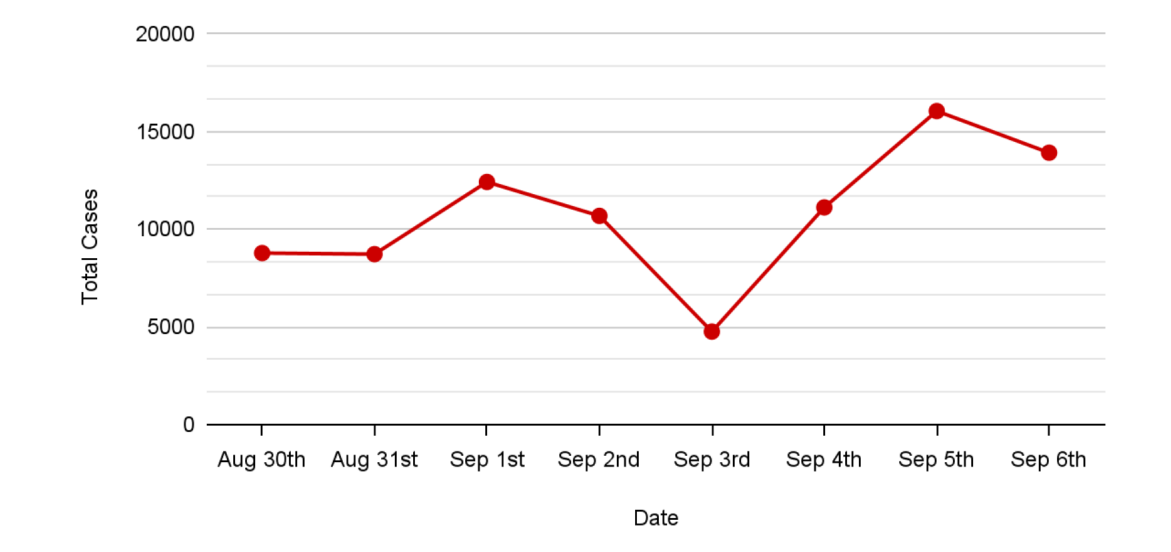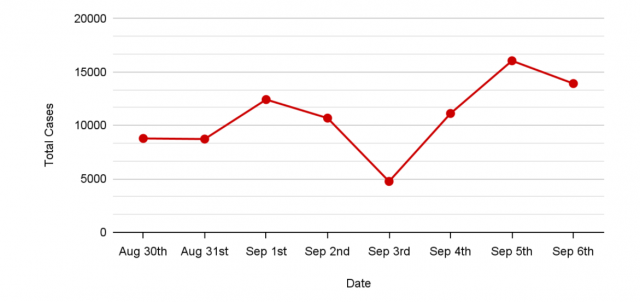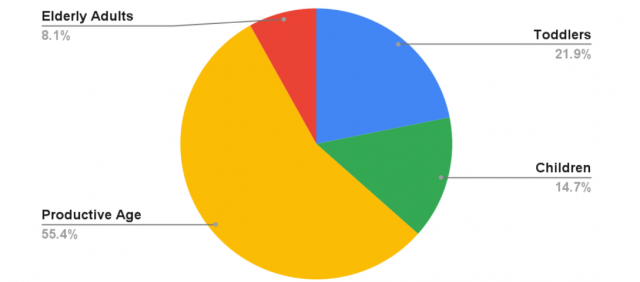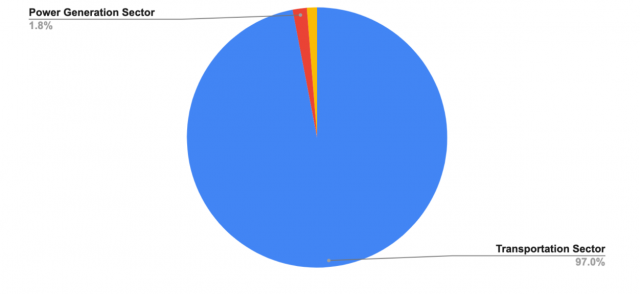We Care, So We Clean The Air: A Campaign to Improve Jakarta’s Air Quality

How serious is Jakarta air pollution?
After constantly placing in the top 10 most polluted cities worldwide since May, Jakarta, the capital of Indonesia, topped the list as the city with the highest level of pollution or the most polluted city in the world on Wednesday, August 9th, 2023. This is based on information provided by the Swiss company IQAir (Chen, 2023). With a population of more than 10 million, Jakarta experiences dangerous air pollution levels practically every day.
Obviously, this is a fear for everyone in the area, not just the citizens who live in Jakarta but also the surrounding areas, such as Bogor, Depok, Tangerang, Bekasi (Jabodetabek). In addition, ISPA (ARI), or Accurate Respiratory Diseases, which are on the rise in Indonesia’s major cities, are also majorly caused by the air pollution issue. The Indonesian Ministry of Health even revealed that from August 29th to September 6th 2023, there were 90,546 non-pneumonia ISPA cases in Jabodetabek regions. At the start of this particular week, the number of cases started to rise. As seen in Figure 1, a total of 4,759 daily cases were reported on September 3rd, 2023. On September 4th, this number considerably jumped to 11,116 instances, and on September 5th, it increased once again to 16,074 cases (Arlinta, 2023).

Even more concerning is the fact that the reported cases of ISPA were discovered to primarily affect the productive age group. Further information reveals that of the 86,466 ISPA cases in the particular week above, 55.4% of people of productive age were affected. Meanwhile, in other age categories, this also affected 21.9% of the toddlers, 14.7% of children, and 8.1% of elderly adults. This is most likely to occur because the people of the productive age group still engage in numerous outdoor activities and they are not yet fully aware of how to most effectively defend themselves from the impacts of the pollution.

This confirms WHO findings that the population of Jakarta and its surrounding areas may potentially have shorter life spans due to air pollution. According to CNN Indonesia (2023), doctors find that air pollution may not directly cause death, but if the air pollution issue in Jakarta fails to be solved quickly, millions of citizens are expected to lose 2.4 years of average life expectancy in comparison to WHO standards. This is because severe air pollution can be the root of many illnesses other than ISPA.
The causes of severe air pollution in Jakarta
A variety of causes contribute to the severe air pollution in Jakarta and the surroundings. However, studies show that the main source of air pollution in Indonesia’s metropolitan cities is carbon monoxide (CO) emissions from motorized vehicles. According to a presentation by the Minister of Environment and Forestry (LHK), Siti Nurbaya, on improving Jabodetabek air quality, the transportation sector contributes 96.36% or 28,317 tons per year to the major producers of carbon monoxide emissions, followed by power generation at 5,252 tons (1.76%) per year, and industry at 3,738 tons (1.25%) per year (Muliawati, 2023). Figure 3 shows the percentage of major producers of CO emissions in Jakarta.

In addition, it was discovered that when compared to gasoline-powered private vehicles, diesel-powered private cars, passenger cars, and buses, motorcycles emit the most pollution per passenger. With a population of 78% of the 24.5 million motorized vehicles in DKI Jakarta by 2022 and an increase of 1,046,837 motorbikes annually.
How should we act to combat Jakarta’s Air Pollution?
We propose a campaign called We Care, So We Clean The Air that is expected to come into operation in an effort to tackle the severe air pollution problem starting in every area of Jakarta. The campaign’s main strategy is to collaborate with the Indonesian government, public figures, and UMKM (Usaha Mikro, Kecil, dan Menengah or Indonesia’s Small and Medium-sized Enterprises) in F&B and fashion sectors to persuade residents of Jakarta and the surrounding areas to refrain from using private vehicles on Sunday, the final day of the week when the majority of people are on a break, hence the super busy city can also take a break and breath.
With this campaign, instead of calling the day “Sunday”, the citizens and campaign holders are also encouraged to call the day or program “SundAir” to enhance the catchiness and interest. There are few exceptions, but this initiative does support environmentally friendly transportation while also reducing air pollution.
The goals of this campaign are to increase public awareness of the severity of air pollution in Jakarta and its effects on public health, reduce carbon emissions by encouraging locals to use alternate modes of transportation, promote collaboration between the government, influencers, and UMKM to have a greater impact, and promote environmentally friendly transportation options such as cycling, walking, and taking public transportation.
How “SundAir” works?
First and foremost, SundAir’s necessary permissions, traffic management, and closures of roads will be supported by the Jakarta government and traffic police. In order to assure the security and comfort of the citizens, they will also deploy resources like law enforcement officers and public transit. There may be new regulations or incentives to encourage eco-friendly modes of transportation and lower automobile emissions. In order to determine the effectiveness of the campaign, they will also work together to gather information on traffic patterns, public involvement, and air quality.
Secondly, by working with a number of public figures and influencers, they can help spread the word about this campaign and promote it using their social media, public appearances, and endorsements. They can also serve as role models by actively taking part in SundAir and inspiring their followers to do the same. In addition, they may create interesting content, like posts and videos, with the hashtags #CleanAirSundAir and #CareForAir to emphasize the advantages of lowering air pollution and using sustainable transportation methods.
Thirdly, by providing vouchers of discounts, promotions, or other incentives to clients who meet the requirements to be SundAir participants, the campaign will also partner with and even assist numerous UMKM (F&B and fashion) parties simultaneously. The vouchers will also expire in each week, which will motivate citizens to engage frequently. In addition, SundAir will indirectly be known to the owners and employees of the UMKM, who will also assist in spreading the word about the campaign through their marketing channels.
Specifically, SundAir will be deployed on Sundays of every week starting in November 2023 from 6 A.M. to 9 P.M. Nearly every road in Jakarta will be off-limits to private vehicle use, though public transportation coverage will be extended to those restricted roads. In many points of the road, such as public transportation stations and crossroads, there will be a machine provided which can be scanned with any e-money cards, such as BCA Flazz, BRI BRIZZI, and e-Toll Card to collect the weekly vouchers for purchasing products from the thousands registered UMKM in Greater Jakarta. However, several sectors, such as emergency services sectors, security sectors, delivery sectors, etc are exceptions in this campaign.
The challenges
The most difficult task for the success of this We Care, So We Clean The Air campaign is convincing people in Jakarta to give up their private vehicles, even for a day. It will be essential and challenging to spread the word about the campaign’s importance and environmental advantages, especially in a metropolis where many people are busy and are unlikely to prioritize environmental matters. Furthermore, the majority of residents in large cities already believe that using a private vehicle everywhere is simply more convenient for them.
After considerable discussion, it is asserted that these reasons are what will help this campaign succeed in convincing the public that using public transportation, walking, and cycling are not all that terrible when done only once a week. Who knows, given how advanced and well-supported Jakarta’s mass transportation systems are right now, this might really enhance people’s desire in developing the habit of not using private vehicles. In order to create a better environment for the citizens themselves to live in, metropolitan citizens should be pushed to discover convenience outside of their comfort zone and let the city breathe.
Main takeways
- Jakarta has a serious air pollution problem that needs to be addressed right away. The city consistently ranks among the most polluted cities in the world, with frequently much lower air quality than what is considered safe.
- It is essential to address this situation immediately, and the “We Care, So We Clean The Air” campaign can be a crucial initial step in avoiding an emergency for the environment and public health.
- The collaborative strategy of the campaign brings the government, celebrities, and UMKM, together to provide hope for Greater Jakarta’s future.
- The initiative has the potential to drastically reduce the city’s air pollution problems by promoting cleaner mobility options, engaging in sustainable behaviors, and lowering vehicle emissions.
References
Arlinta, D. (2023, September 9). ISPA kembali meningkat, mayoritas pasien usia produktif [ISPA is increasing again, the majority of patients are of productive age]. Kompas. https://www.kompas.id/baca/humaniora/2023/09/09/ispa-kembali-meningkat-mayoritas-p asien-usia-produktif
Chen, H. (2023, August 16). Jakarta is the world’s most polluted city. And Indonesia’s leader may have the cough to prove it. CNN. https://edition.cnn.com/2023/08/16/asia/indonesia-pollution-jokowi-cough-intl-hnk/index .html#:~:text=On%20August%209%2C%20Jakarta%20topped,shows%20air%20pollutio n%20over%20Jakarta.
Muliawati, F. D. (2023, August 23). Polusi udara Jakarta akut, ternyata ini biang keroknya [Jakarta’s air pollution is acute, it turns out this is the culprit]. CNBC Indonesia. https://www.cnbcindonesia.com/news/20230823082854-4-465295/polusi-udara-jakarta-a kut-ternyata-ini-biang-keroknya
Polusi udara pangkas harapan hidup orang Jakarta, ini kata dokter [Air pollution is cutting the life expectancy of Jakartans, doctors say]. (2023, August 30). CNN Indonesia. https://www.cnnindonesia.com/gaya-hidup/20230830170019-255-992500/polusi-udara-p angkas-harapan-hidup-orang-jakarta-ini-kata-dokter
Contributor: Zefanya Avrilliane, B2025
Editor: Lily El Ferawati

